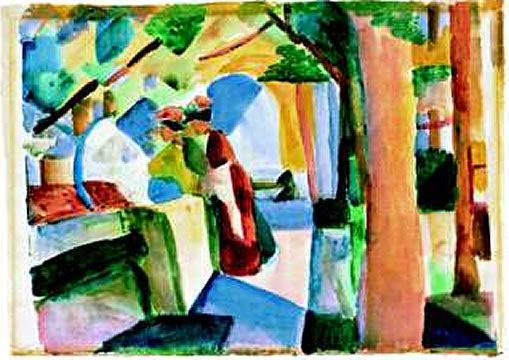Description
The painting "in the cemetery" of August Macke is a work that, although it is not one of his most recognized pieces, deeply reflects the artist's aesthetic and emotional concerns, as well as his belonging to the German expressionist avant -garde. Macke, member of the expressionist group known as "El Puente" (Die Brücke) and the "Der Blaue Reiter" movement, is characterized by its vibrant use of color and its ability to transmit moods through form and composition.
In "In the cemetery", Macke captures a scene full of symbolism and emotion. The work shows figures that seem to be in a moment of reflection or duel, located in an environment that evokes the solemnity of a cemetery. The composition is organized so that human figures are inserted in a framework of lush trees and an architecture that could be interpreted as the representation of the border between life and death. The viewer's attention is captured by the contrast between the leafy trees and the darkest tones of the figures.
The use of color in this work is particularly remarkable. Macke uses a palette that combines dark tones with more vivid colors, creating a dialogue between sadness and hope. The deep green of the vegetation contrast with the most turned off of the clothing of the figures, suggesting a sense of isolation and introspection. This chromatic choice can be interpreted as a reflection on human life in relation to its inevitable end.
The figures that residents seem to be dressed in a traditional way, which can refer to a specific historical context. However, the lack of an individualized portrait and the way in which they are organized in space allow greater interpretation, suggesting that they could be representations of humanity as a whole, a collective that faces loss and duel. The way in which the figures are grouped, somewhat tight, evokes a sense of community, of mutual support in moments of sadness.
August Macke, born in 1887, was an artist whose life was tragically interrupted by World War I in 1914. His work lies in a constant search for beauty and emotional connection, and his style is characterized by a lyrical approach and an exploration of the relationship between color, shape and light. "In the cemetery" is part of a broader corpus in which the dualities of human existence are manifested in an expressive and moving visual language.
In terms of historical context, this work is inserted in a tumultuous period in Germany's history, a time when art sought new ways of expressing the complexity of human experience. Macke, along with other expressionists, moved away from traditional representations to explore what can be captured from an emotional perspective. "In the cemetery", in its thematic simplicity and its emotional depth, it aligns with other works of the time, where the approach was not only in the representation of the environment, but in the ability of painting to evoke deep emotions and existential reflections .
In conclusion, "in the cemetery" is a work that invites contemplation, a moment of introspection where the viewer can connect with the universal experiences of duel and memory. It is a testimony of Macke's talent to combine color, shape and emotion in a visual dialogue that resonates with the essential humanity of all of us.
KUADROS ©, a famous paint on your wall.
Hand-made oil painting reproductions, with the quality of professional artists and the distinctive seal of KUADROS ©.
Art reproduction service with satisfaction guarantee. If you are not completely satisfied with the replica of your painting, we refund your money 100%.

